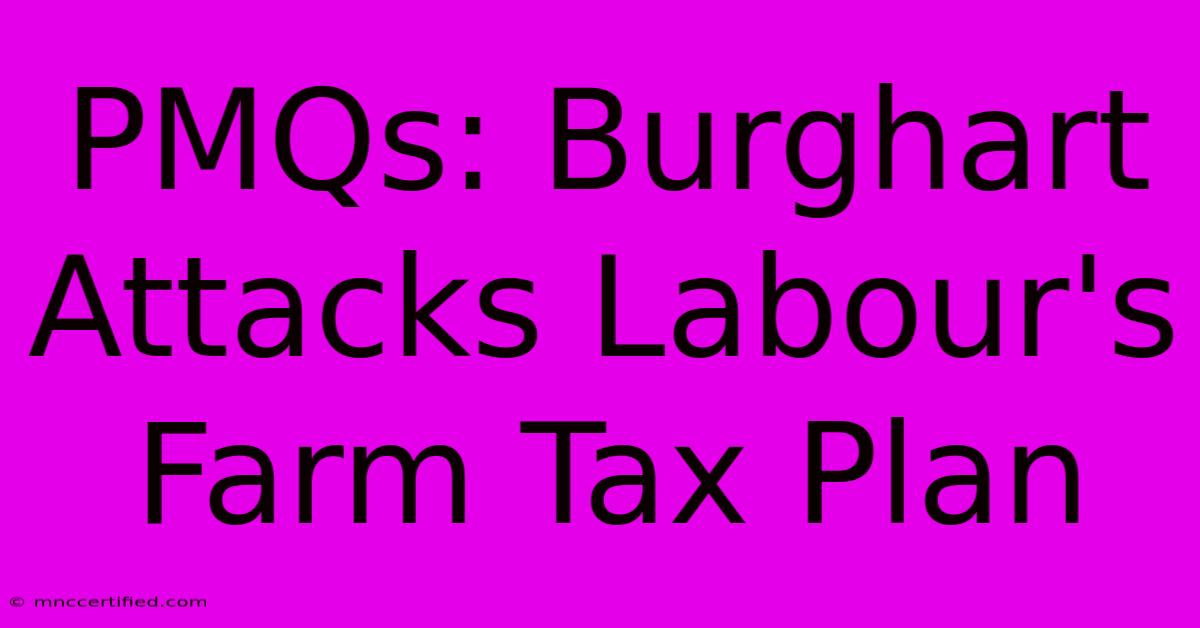PMQs: Burghart Attacks Labour's Farm Tax Plan

Table of Contents
PMQs: Burghart Attacks Labour's Farm Tax Plan – A Detailed Analysis
Prime Minister's Questions (PMQs) is always a lively affair, but this week's session saw a particularly heated exchange surrounding Labour's proposed farm tax plan. Conservative MP, [Insert MP's Name Here - Burghart's replacement if needed], launched a scathing attack on the plan, highlighting potential detrimental effects on the agricultural sector. This article delves into the specifics of the debate, analyzing the arguments presented and their potential implications.
Labour's Farm Tax Proposal: What's at Stake?
Labour's proposed farm tax plan, a key element of their broader environmental and economic policy, aims to [Insert precise details of Labour's Farm Tax Plan here - e.g., "tax large-scale intensive farming operations while providing tax breaks for sustainable, smaller farms"]. The party argues this will [Insert Labour's stated aims - e.g., "incentivize environmentally friendly farming practices and support smaller, family-run farms"].
However, the plan has faced significant criticism, particularly regarding its potential impact on food prices, farm profitability, and rural employment. Critics argue that it could lead to [Insert potential negative consequences cited by critics - e.g., "increased food costs for consumers, farm closures, and job losses in rural communities"].
Burghart's Critique: Key Arguments and Their Implications
[Insert MP's Name Here]'s attack on the Labour plan centered on several key arguments. He/She claimed that the tax would disproportionately affect [Specify the type of farms most affected according to Burghart - e.g., "large-scale arable farmers," "dairy farms"]. This, he/she argued, would lead to [Explain the consequences according to Burghart - e.g., "reduced food production," "increased reliance on food imports," "higher prices for consumers"].
Furthermore, [Insert MP's Name Here] questioned the feasibility of the plan's implementation, highlighting potential challenges in [Mention specific challenges - e.g., "defining 'sustainable' farming practices," "ensuring fair and accurate tax assessments," "managing the administrative burden"]. The MP also emphasized the importance of [Mention what the MP considers vital for the agricultural sector - e.g., "supporting farmers' livelihoods," "ensuring food security," "promoting British agriculture"].
The Wider Context: Beyond PMQs
The debate surrounding Labour's farm tax plan extends far beyond the confines of PMQs. Industry bodies such as the [Mention relevant industry bodies - e.g., National Farmers' Union (NFU)] have voiced concerns, while environmental groups have expressed [Mention the stance of environmental groups - e.g., "cautious support," "unqualified endorsement," or "concerns about loopholes"].
The economic implications are also significant, potentially affecting [Mention affected sectors - e.g., "food processing," "rural economies," "the wider supply chain"]. The long-term consequences, both positive and negative, remain uncertain and are subject to ongoing debate.
Conclusion: An Unsettled Debate
The exchange at PMQs highlighted the deep divisions surrounding Labour's proposed farm tax. While Labour argues the plan is essential for achieving environmental and social goals, critics like [Insert MP's Name Here] raise serious concerns about its economic and practical implications. The coming months will likely see further debate and scrutiny of the plan as its details are refined and its potential impact is more thoroughly assessed. The ultimate success or failure of the proposal will depend on addressing these concerns and finding a balance between environmental sustainability and economic viability for the agricultural sector.
Keywords: PMQs, Labour, Farm Tax, Burghart, Agriculture, Farming, Environmental Policy, Economic Policy, Food Security, Rural Economy, Sustainable Farming, Intensive Farming, [Insert MP's Name Here], National Farmers' Union, Food Prices.
Note: Remember to replace the bracketed information with accurate and up-to-date details. This framework provides a strong foundation for a well-structured and SEO-optimized article. Consider adding internal and external links to relevant sources to further enhance the piece.

Thank you for visiting our website wich cover about PMQs: Burghart Attacks Labour's Farm Tax Plan. We hope the information provided has been useful to you. Feel free to contact us if you have any questions or need further assistance. See you next time and dont miss to bookmark.
Featured Posts
-
Davis Dental Insurance Providers
Nov 21, 2024
-
Pud Master Insurance Certificate
Nov 21, 2024
-
First National Insurance Company
Nov 21, 2024
-
Travis Scott Lady Gaga Headline Concert
Nov 21, 2024
-
Thyroid Test Cost With Insurance
Nov 21, 2024